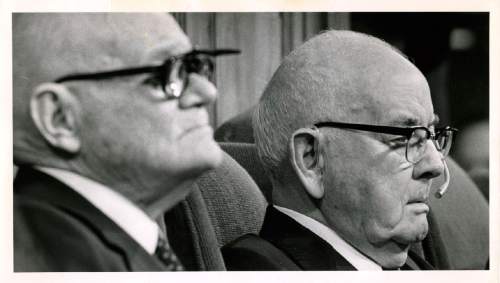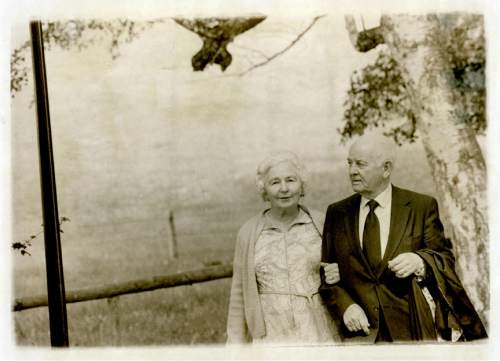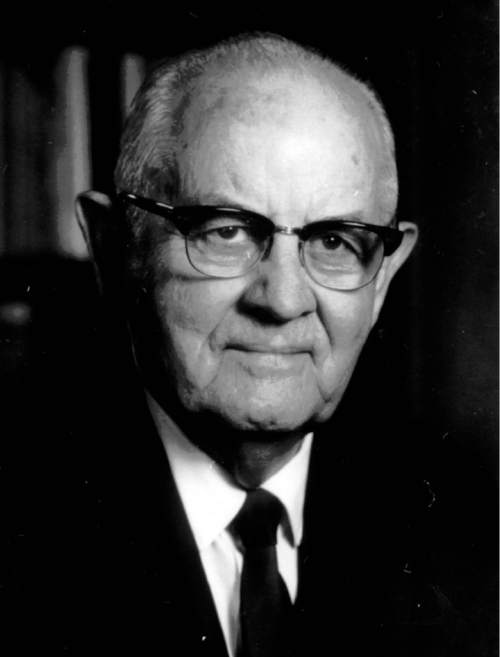This is an archived article that was published on sltrib.com in 2015, and information in the article may be outdated. It is provided only for personal research purposes and may not be reprinted.
The late LDS Church President Spencer W. Kimball's "The Miracle of Forgiveness," a classic but controversial book that shaped Mormon sexual assumptions for generations, is quietly disappearing.
The much-circulated 1969 treatise on guilt, wrongdoing and repentance by then-apostle Kimball, who died in 1985, presented masturbation "as too often [leading] to ... homosexuality," gay sex as a "crime against nature" that sometimes leads to sex with animals, and premarital sex as "the sin next to murder."
"All such deviations from normal, proper heterosexual relationships are not merely unnatural," he wrote, "but wrong in the sight of God."
The book, which now has sold at least 1.6 million copies, was routinely distributed to departing Mormon missionaries, engaged LDS couples and members disciplined for "sexual sin."
The hardcover version of "Miracle" is now out of print, according to Deseret Book marketing manager Dave Kimball (a distant relative of the late Mormon prophet), and the paperback is listed as "out of stock indefinitely."
The paperback's OSI designation "is a status we typically use on older, slower-moving titles," the Deseret Book manager writes in an email, "whose replenishment [printing] orders are fewer and further between."
An electronic version remains available, and new and used copies still are floating around.
Some Mormons, however, are pleased to see the book fade from use.
"Miracle" was "written by a beloved apostle, then president of the church,' says Erika Munson, co-founder of Mormons Building Bridges, which works to improve ties between the LDS and LGBT communities, "but it is not in alignment with current LDS Church doctrine and policy that being gay is not a choice and not a sin."
The Church of Jesus Christ of Latter-day Saints teaches that same-sex attraction is not a sin, only acting on it is.
For decades, the book has been handed out "by well-meaning bishops," Munson says, "but has caused a lot of pain on the part of LGBT Mormons, their families and allies."
Kimball's instruction that "if you pray hard enough, fast hard enough, and are a good enough Mormon, your sexual orientation will change or go away," she says, "has caused incredible pain and has even cost lives."
Several gay-support groups have seen LGBT Mormons who were kicked out of their homes, battled self-loathing and even committed suicide over beliefs such as these.
There is still "a lot we don't understand," Munson says, "but this is a further step in embracing the identity and special gifts gay Mormons have and bring to our homes and congregations."
Even the late Mormon prophet had second thoughts about the book, based on his many years counseling LDS youths.
"The book's tone, tougher than Spencer's in-person counseling, reflected his belief that people rationalize sin too quickly and consider repentance easy," writes the Mormon leader's son, Edward L. Kimball's in a popular 2005 biography of his father, "Lengthen Your Stride: The Presidency of Spencer W. Kimball."
Indeed, writes the son, "Miracle" was a book "more on sin and repentance than on forgiveness."
Kimball "later seemed to wish he had adopted a gentler tone," Edward Kimball writes.
In 1977, the Mormon leader said to Lyle Ward, his neighbor, "Sometimes I think I might have been a little too strong about some of the things I wrote in that book."
Some members wrote to say the book's "stiff medicine was rightly prescribed" and brought them "to their senses," Edward Kimball writes, but when others "became discouraged by a standard that seemed to them unattainable, he wished he had communicated more understanding and encouragement."
Allen Bergin, a retired Brigham Young University psychologist, says he has read "the ugly chapter on homosexuality ... many times."
"There are some good things in it that are useful," says Bergin, former president of the Association of Mormon Counselors and Psychotherapists. "But they are overshadowed by a host of negatives and also outdated policies that the church itself doesn't even endorse any more."
Bergin says his affection for the Yoda-like Mormon prophet is undiminished, which is why the former BYU professor welcomes the book's apparent retirement.
"He did some wonderful personal things for me that I will always treasure. He was truly a great person," Bergin says. "It is unfortunate that his reputation for goodwill is obscured by some extreme adjectives he used 45 years ago."
Kimball's grandson Jordan Kimball echoes that sentiment.
"I would want him to be remembered," Jordan Kimball says, "for his love, compassion and encouragement."
"Miracle" grew "out of his experience of the 1940s, '50s and '60s, and, in its time, it didn't seem out of place," Jordan Kimball says, "but it was used beyond its due date. Even the church has moved on."
Some members of the late prophet's family, Jordan Kimball says, wished the now-anachronistic book could have been "allowed to sunset."
He believes that's what his grandfather would have wanted.
Twitter: @religiongal







